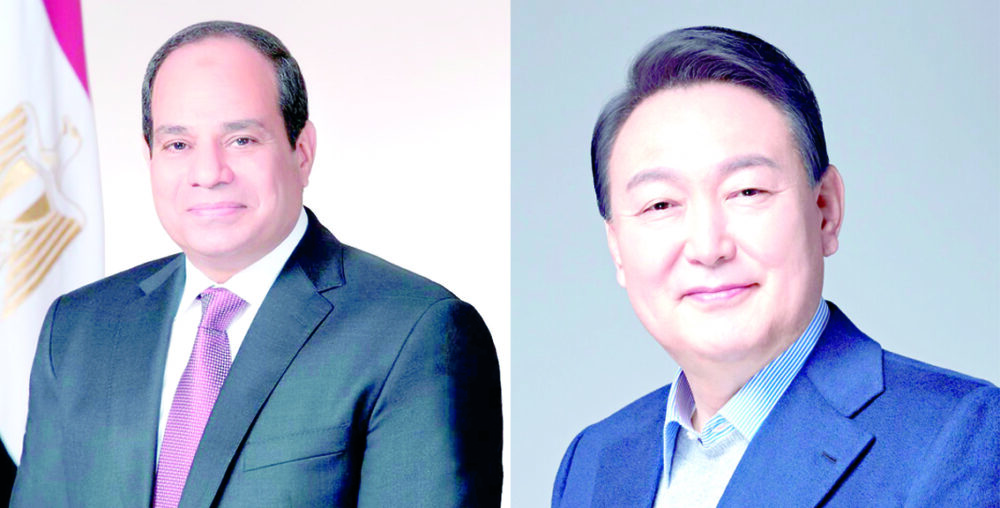Egypt and South Korea are set to forge stronger ties in all fields. Thanks to recent successes bolstered by their huge economic and geopolitical potentials, the two countries will increase their contributions to regional and international peace and stability.
Signs of a new era of bigger and more prosperous relations Egypt and South Korea are aspiring to have become more visible after the election of Yoon Suk-yeol as President of South Korea.
In their first phone call, President Abdel Fattah El Sisi and his South Korean counterpart Yoon exchanged identical points of view on challenges and crises, the fallouts from which are affecting the world.
The two leaders also exchanged views of regional and international issues of mutual concern, including climate change and food security. Egypt and South Korea share concerns over this global phenomenon, which has manifested itself in severe droughts and formidable storms – all unequivocal signs of the unfolding climate emergency. At the same time, millions of people throughout the world are confronting the impacts of simultaneous crises in energy, food, water and cost of living, aggravated by severe geopolitical conflicts and tensions. With the key aim of ensuring full implementation of the Paris Agreement, the UN has kick-started Climate Change Conference COP27 in Egypt.
Yoon, a graft prosecutor turned opposition leader, won the presidential election in South Korea in March this year. In his election campaign, President Yoon called for joining forces together for the people and the nation. He pledged to open an era of unity and harmony in his country. The election of President Yoon has stimulated optimism in South Korea over a new future for stability and security in Korean peninsula.
Likewise, assuming his presidential responsibilities in 2014, President Sisi called upon the Egyptian people to rally support to efforts he initiated to help Egypt become stronger and more prosperous from the tragic legacy of the Muslim Brotherhood in power. Egypt was on the brink of abyss after the terrorist group seized power in 2012. Although their presidency was very brief (less than a year), the MB used treacherous religious slogans and creed to divide and traumatise the Egyptian nation.
Fulfilling his pledge to the nation, President Sisi led Egypt to celebrate an unprecedented era of stability and security, which have encouraged major economies in the world led by South Korea to increase their investment in Egypt.
South Korea is Egypt’s major economic and strategic partners in increasing investment and development projects in the largest Arab country. Local consumers and economic experts are maintain that South Korea has won a credibility unchallenged by its heavyweight economic rivals in the Egyptian market.
Also, motivated by their identical views, President Sisi and his South Korean counterpart Yoon acknowledge that economic security and technology security and even human security are powerful and effective weapons in overcoming unprecedented challenges of the new reality founded in their respective regions and internationally.
On the other hand, under Sisi and Yoon, Egypt and South Korea are set to play a central role in the new world order, which is taking shape as a result of the Russian-Ukrainian war. The two countries have committed themselves to making use of their prosperous and strong relations to help preserve stability and establish unshakeable peace in the Arab region and on the Korean peninsula. Sisi and Yoon uphold the view that the removal weapons of mass destruction from the Middle East and the Korean peninsula will end the nightmare peoples in both sides have been experiencing for decades.
Anti-corruption campaign is the battlefield presidents Sisi and Yoon have separately vowed to pursue relentlessly. Yoon, a relentless hunter for corrupt high-ranking officials convicted President Park Geun-hye on corruption charges. He also went after another former president and the head of Samsung.
In Egypt, war against corruption was one of President Sisi’s presidential pledges when he assumed his office. He stressed to powerful watchdog Administrative Control Authority to crack down on corrupt officials, especially those assuming powerful and decision-making offices in the government and public sector. President Sisi made it clear to ACA that corruption would badly and disastrously impact efforts to encourage the flow of Arab and foreign investments in Egypt.
In August 2020, President Sisi approved Egypt’s accession to the African Union Convention for the Prevention and Combating of Corruption. The 2003 agreement, signed in Maputo, Mozambique, aims to encourage and strengthen measures by African states to prevent, punish and eradicate corruption and related crimes in the public and private sectors.





Discussion about this post